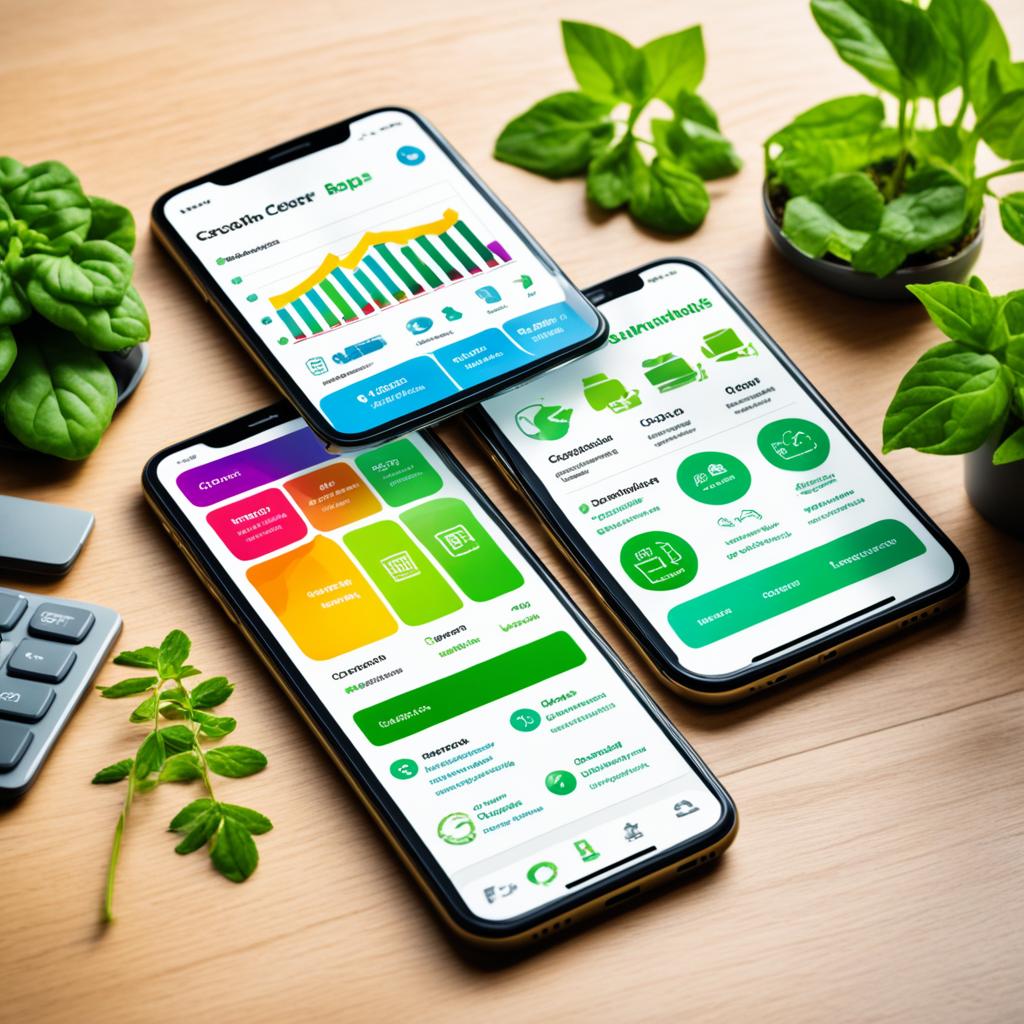In a world where climate change is becoming an increasingly pressing challenge, many companies are recognizing the need to integrate environmentally conscious technologies into their everyday operations. Sustainable B2B apps offer an ideal platform for reducing the CO2 footprint and actively contributing to Contribution to sustainability to perform. These intelligent digital helpers analyze, optimize and transform business processes with the aim of noticeably reducing environmental impact.
Thanks to their user-friendly applications, behaviors and routines in the corporate context are made more sustainable. From the monitoring and management of energy consumption to the promotion of environmentally friendly alternatives sustainable B2B apps are the key to a comprehensive ecological corporate strategy.
Key findings
- Sustainable B2B apps are essential for modern companies that want to Reducing the CO2 footprint want.
- The use of environmentally conscious technology reflects a company's commitment to ecological responsibility.
- Apps such as Climate Compass and Ecosia make it possible to get a real Contribution to sustainability perform.
- Digital solutions enable companies to easily integrate ecological processes into their day-to-day work.
- The focus on sustainability in B2B apps can have a positive effect on the company image and customer loyalty.
The importance of sustainability in B2B companies
The landscape of the business world is undergoing a green revolution. For B2B companies, sustainability is becoming a decisive competitive factor that determines their own market position and image. In view of increasing environmental policy requirements and a growing consumer awareness of ecological issues, sustainability is becoming a key competitive factor. Corporate Social Responsibility (CSR) is an integral part of the strategic orientation of business relationships.
Importance of CSR in the B2B sector
Sustainable companies are increasingly confronted with the demand to take a proactive role in environmental protection and to establish CSR as part of their corporate identity. This not only affects internal processes, but also extends to interactions with other companies that are placing increasing emphasis on socially responsible management.
CSR in B2B companies is both demanded from the outside and driven from within. It has become an essential element of brand management that not only strengthens customer loyalty, but also contributes to employee satisfaction and better investment decisions.
Growing demand for environmentally conscious technology
The market for Environmentally friendly applications and services is on the upswing. In tenders and partnerships, components such as Energy efficiencyconservation of resources and a low carbon footprint. The awareness that green business solutions can be both ecologically valuable and economically advantageous, has led to increased demand in this segment.
The availability of, for example, cloud-based technologies that enable a reduction in energy consumption or smart grid solutions that promote more efficient energy management is a decisive factor in B2B business today.
| Criterion | Significance for B2B | Contribution to sustainability |
|---|---|---|
| Energy efficiency | Reduction in energy consumption | Reduction of CO2 emissions |
| Resource management | Optimal use of raw materials | Conservation of natural resources |
| CSR strategy | Image cultivation and customer loyalty | Social responsibility and ethical behavior |
| Digitization | Increasing efficiency and reducing costs | Reduction of paper waste and promotion of virtual formats |
The global shift towards greater sustainability is a challenge that B2B companies cannot - and should not - ignore. Promoting sustainable business practices is an opportunity to strengthen your own brand and secure the long-term future of your company.
Sustainable B2B apps: definition and areas of application
Under Definition of sustainable B2B apps We understand the term "green apps" to mean applications that pursue the goal of designing business processes in companies in such a way that they protect the environment as much as possible and use resources efficiently. Such apps help to integrate ecological awareness into the everyday life of companies and open up a variety of opportunities. Areas of application for environmentally conscious technology. They cover areas such as energy management, waste reduction and the promotion of sustainable working practices.
Due to their wide range of applications, sustainable B2B apps have the potential to profoundly change business models. They not only facilitate the transition to greener business practices, but also provide a solid foundation for environmentally conscious branding and thus improve a company's image.
Another important aspect is the potential of these applications to reduce the carbon footprint. Continuous analysis and optimization of processes are crucial for the success of such apps. They ensure a more sustainable production method and a reduction in unnecessary waste of resources.
Their applications range from improving organizational processes to fleet management and intelligent building technology. All of these Areas of application for environmentally conscious technology ultimately serve the overarching goal of Corporate Social Responsibility.
| Range | Goal | Example |
|---|---|---|
| Energy management | Efficiency and savings | Smart electricity meters |
| Waste reduction | Tracking and reducing waste streams | Recycling apps |
| Resource planning | Optimized resource planning of raw materials | Material requirements planning tools |
| CO2 footprint analysis | Measurement and strategy development for reduction | Climate compass |
Last but not least, it is very important for companies that the B2B apps used contribute to sustainability not just selectively, but in all areas of the company - an approach that promises high efficiency both ecologically and economically.
How sustainable apps help to reduce CO2 emissions
Sustainability in everyday business begins with the realization that technical innovations have a direct impact on the ecological footprint. Sustainable B2B apps in particular are a prime example of how technological progress and environmental protection can go hand in hand. Through the targeted use of such applications, significant steps can be taken towards reducing CO2 emissions in companies.
Energy efficiency through digitalization
A key pillar in the pursuit of an improved CO2 balance is the Energy efficiencywhich is significantly influenced by the process of digitalization. Digital tools and apps make it possible to monitor and control energy flows and thus optimize consumption. This leads to lower energy requirements and thus to a reduction in CO2 emissions, whereby the Efficiency through digitalization is constantly being improved.
Optimization of logistical processes and resource management
In the field of logistics, sustainable B2B apps work wonders by optimizing supply chains and transport routes. The intelligent Resource managementThis is made possible by such applications, which helps to avoid overproduction and significantly reduce material consumption. The result is an economical operation that Reduce CO2 emissions and contributes to the conservation of natural resources.
| Measure | Mode of action | CO2 savings potential |
|---|---|---|
| Smart metering | Precise measurement and control of energy consumption | Higher energy efficiency through real-time data |
| Data analysis | Identification of potential savings | Reduction of unnecessary energy flows |
| Optimized route planning | Efficient design of transport routes | Reduced emissions in the logistics sector |
| Digital Resource management | Targeted material planning and use | Reduction of raw material consumption |
Examples of sustainable B2B apps and their impact
Your content will replace this text. The content should follow a logical flow and provide engaging, informative content on the topic provided. Remember to include the relevant SEO keywords, ensure authenticity by using real names and brands, and use the appropriate HTML tags as outlined in the instructions.
Efficient journey and route planning with B2B apps
In today's business world, a Efficient route planning crucial to saving time and minimizing fuel consumption. Sustainable B2B apps such as the Climate compass not only offer support in optimizing routes, but also help to reduce CO2 emissions and thus protect the environment. These apps are characterized by the use of intelligent algorithms that calculate the best routes in real time and reduce traffic-related pollution.
Reducing paper consumption through digital solutions
Digital applications make a significant contribution to reducing paper consumption and thus relieving the burden on the environment. Apps that enable digital document management show how everyday office life can be transformed sustainably. For example, the use of platforms such as Too Good To Go not only helps to reduce the waste of resources, but also raises awareness of sustainability in the business process.

Sustainable B2B apps examples impressively demonstrate how technological advances and ecological commitment can go hand in hand. Such applications, which enable a reduction in energy and resources and at the same time optimize business processes, are forward-looking for any environmentally friendly company.
| Sustainable B2B app | Field of application | Ecological benefits |
|---|---|---|
| Climate compass | Route planning | Reduction of travel distances and CO2 emissions |
| Too Good To Go | Food rescue | Reduction of food waste |
| Document management system | Reduce paper consumption | Reducing paper waste and protecting forests |
| EcoFleet | Fleet management | Optimization of vehicle use and reduction of operating costs |
Integration of renewable energies in B2B apps
The Renewable energy B2B sector is faced with the ongoing task of making sustainability a core component of its operating strategy. In particular, the Integration renewable energies into existing business processes is an innovative method of meeting these requirements. B2B apps play a crucial role here by enabling companies to record, analyze and ultimately optimize sustainable energy solutions.
B2B apps that have been specially developed for analyzing consumption data and controlling energy use provide a sound database that can be used as a basis for setting realistic targets for reducing energy consumption. Monitoring tools within the apps also make it possible to visualize successes in the use of renewable energies and thus motivate further environmentally conscious action.
Within the complex structure of B2B companies, every single energy-related decision contributes to the CO2 balance and reduce the consumption of fossil fuels. This is why modern B2B apps offer features that not only display current consumption transparently, but also make recommendations for switching to or improving the use of renewable energy solutions give.
| Function | Benefit | Contribution to sustainability |
|---|---|---|
| Real-time consumption data | Monitoring the energy flow | Creating awareness of current energy requirements |
| Forecasting tools | Forward-looking planning of energy requirements | Optimization of energy procurement |
| Simulation of renewable energies | Planning the switch to and expansion of renewable energy sources | Promoting investment in sustainable energy production |
| Automation | Increase in operating efficiency | Reduction of energy consumption and reduction of the CO2 footprint |
This digital integration of renewable energy into the B2B sector not only reduces the environmental impact of operations, but also helps companies to play their part in global energy efficiency and climate protection. These apps open doors for new business models and innovations that have a positive impact on the environment and at the same time ensure the economic success of companies.
Promoting a green corporate culture through digital tools
Digitalization is increasingly intervening in corporate culture and reshaping it towards sustainability. Digital tools play a decisive role in this, not only making operational processes more efficient, but also bringing a new awareness of environmental protection into the everyday lives of companies. Information apps are particularly important here, as they help to educate and raise awareness and Change management-processes in the context of sustainability.
Education and awareness-raising through information apps
Apps like Codecheck are the eyes and ears of contemporary consumers and companies. They provide important information on ingredients and the environmental impact of products. The Sustainability Education goes beyond pure product information and actively promotes a Green corporate cultureby raising awareness of ecologically sustainable action.
Change management in the context of sustainability
Change management is the key to companies mastering difficult transition processes towards a more sustainable way of doing business. Digital tools are essential in preparing employees for the changes and allowing them to actively participate in the development of ecological objectives. A future worth living is thus made tangible and comprehensibly integrated into day-to-day operations.
| Tool | Purpose | Effect |
|---|---|---|
| Codecheck | Product information | Education and awareness-raising |
| Change management Software | Change processes | Supporting a sustainable corporate culture |
| Digital training platforms | Employee training | Promotion of environmental skills |
| Environmental analysis tools | Operational optimization | Reduction of resource consumption and CO2 emissions |
The role of stakeholders in promoting sustainable B2B apps
The future viability of companies increasingly depends on their ability, act sustainably and develop innovative green technologies. The various stakeholders play a decisive role in the promotion and dissemination of sustainable B2B apps. They bear responsibility, drive change and thus play a key role in shaping the path towards a greener economy.
Influence and responsibility of investors and shareholders
Investors and shareholders have a considerable Stakeholder influencewhen it comes to initiating the development and implementation of environmentally friendly solutions in the business world. Your Investors Responsibility is not only to provide capital, but also to actively influence the ecological orientation of the companies in which they invest.
Cooperation between companies and developers
An effective Corporate cooperation with app developers is essential to ensure that the applications developed not only generate economic benefits, but also environmental benefits. This cooperation makes it possible to develop customized solutions that meet both the needs of companies and sustainability criteria.
Transparent dialog and regular coordination between all parties involved also promote awareness of sustainable corporate governance and contribute to positive corporate development. Investors who see sustainability as part of their investment strategy can contribute to the following through targeted engagement Environmentally friendly applications increasingly become the focus of corporate action and thus make a long-term contribution to climate protection.
Sustainable technological innovations in the B2B sector
Technological innovation is a driving force in the B2B sector when it comes to developing methods to reduce energy consumption and emissions or the use of carbon-free energy sources. The integration of sustainable technological innovations in business processes is now a critical success factor for responsible entrepreneurship. Particularly noteworthy in this context are innovative apps that green solutions and thus help to minimize the ecological footprint of companies.
They also play a key role in promoting a culture of sustainability within entire industries. Through their application in the B2B landscape, they are not only a testament to entrepreneurial foresight, but also represent an effective tool in the fight against climate change.

- On the way to carbon-neutral operations
- Use of intelligent energy management systems
- Implementation of CO2 emission reduction programs
- Development of apps that enable resource-efficient working
To highlight the added value of such technological developments, the following overview provides concrete examples of how sustainable B2B apps are changing companies and making the economy more sustainable:
| App | Function | Sustainable benefits |
|---|---|---|
| Smart Energy Apps | Monitoring energy consumption | Optimization of energy use and reduction of operating costs |
| Climate-neutral logistics solutions | Efficient route planning | Reduction of fuel consumption and emissions |
| Recycling resource management | Improved waste and recycling management | Reduction of environmental pollution and resource consumption |
| Digital sustainability reports | Documentation and analysis of sustainability indicators | Increased transparency and focus on continuous improvement |
The operational use of these sustainable technological innovations clearly states that green solutions are far more than just a fashion trend. They are an essential part of any company that wants to reduce its ecological footprint and work towards a sustainable future.
Sustainability in practice: success stories and case studies
Sustainability Practical examples are inspiring ways for entrepreneurs to combine responsibility and economic success. Success stories from the B2B sector show how companies can use innovative concepts to reduce their ecological footprint and strengthen their market position at the same time. One of the outstanding examples is the Ecosia search engine, which not only serves as an ecological alternative to conventional search providers, but also actively contributes to environmental protection.
The special thing about Ecosia is that the majority of revenue from advertising goes directly towards reforestation. This gives every user the opportunity to actively support planetary change with their search queries. This type of business model illustrates how sustainability is successfully integrated into the DNA of a company and how ecological aspects become the core of the corporate philosophy.
As the use of Ecosia proves, sustainable technologies have the potential not only to initiate international campaigns for climate protection, but also to achieve concrete ecological successes. Such B2B success stories provide impulses that companies can use as a guide in their search for meaningful investments and partnerships.
Sustainable business models like Ecosia's illustrate that it is possible to effectively combine profit orientation with social and ecological responsibility. Companies that take such practices to heart not only earn recognition for their green commitment, but also position themselves as pioneers in a sustainable economy.
- The introduction of environmentally conscious methods contributes to the company's reputation.
- Sustainable initiatives secure competitive advantages and create trust among customers and partners.
- Promoting ecological projects demonstrates corporate social responsibility to the public.
Inspired by such case studies, more and more B2B companies are striving to develop and apply sustainable strategies. The success of apps such as Ecosia motivates imitation and thus contributes to the wider use of environmentally friendly technologies.
Strategic planning for the development of sustainable B2B apps
The development of sustainable B2B apps requires a well-founded Strategic planning that both increases the efficiency of business processes and actively contributes to environmental protection. A holistic approach that Value chain analysis and forward-looking Technology partnerships is critical to success here.
Analysis of the value chain for potential for sustainability
A thorough examination of each individual stage of the value chain is fundamental to the sustainable alignment of business applications. This includes the identification and evaluation of process steps, materials and methods with regard to their environmental impact and their potential for improvement.
| Process step | Sustainability potential | Measures |
|---|---|---|
| Raw material extraction | Use of eco-certified materials | Auditing suppliers, promoting renewable energies |
| Manufacturing | Use of energy-saving technologies | Process optimization, waste management |
| Logistics | Minimization of transport routes | Efficient route and delivery planning |
| Operation | Energy efficiency in use | Automation and monitoring |
| Disposal/recycling | Strengthening the circular economy | Recyclable design, take-back systems |
Partnerships with environmentally conscious technology providers
Another crucial step in strategic planning is to enter into partnerships with technology providers that are committed to environmental protection. By cooperating with companies that already offer solutions for green business, synergies can be created and the company's own sustainability mission can be effectively supported.
| Technology partner | Range | Sustainable advantage |
|---|---|---|
| Organizations for renewable energies | Power supply | Clean-tech solutions |
| IT company with Green IT certificate | Software and hardware | Resource-saving operation |
| Sustainability consultant | Strategic development | CO2 balancing and reduction |
| Specialists in environmentally friendly packaging | Materials management | Reduction of packaging waste |
| Mobility service provider | Fleet management | Optimal use of electric vehicles |
Through the combination of a profound Value chain analysis with the right Technology partnerships can be used to create market-ready and environmentally friendly B2B apps that meet the requirements of a modern and conscious business world.
Conclusion
Advancing digitalization and growing environmental awareness are inexorably reshaping the business world. Sustainable B2B apps have proven to be central pillars of this transformation. They combine energy savings, emission reductions and resource efficiency and reflect the increased ecological awareness in the business world. The The future of sustainable B2B apps promises to become the backbone of an environmentally friendly and at the same time economically viable business practice.
Importance of sustainable B2B apps for the future
The importance of sustainable B2B apps for the future of business can hardly be overestimated. With their potential to make business processes more resource-efficient and thus reduce the carbon footprint, they are not only drivers of innovation, but also indicators of responsible action. As a result, companies gain competitive strength and demonstrate social responsibility at the same time. The The future of sustainable B2B apps will be crucial to meeting current and future challenges and promoting sustainable growth.
Appeal for a stronger focus on sustainability in the B2B sector
The path to a green economy requires a decisive Focus on sustainability. Environmentally conscious technologies, smart energy solutions and efficient resource management must become an even greater focus of business efforts. Investing in sustainable B2B apps means investing in the future - for companies and society. The appeal for such a focus is a call to action: for innovation, sustainability and a future worth living.
FAQ
What are sustainable B2B apps and how do they contribute to reducing the carbon footprint?
Sustainable B2B apps are digital applications that are designed to make business processes environmentally friendly and efficient. They help to reduce the carbon footprint by enabling the efficient use of resources, optimizing energy consumption and digitizing processes.
Why has Corporate Social Responsibility (CSR) become so important in the B2B sector?
CSR has become important because customers and investors increasingly value companies' commitment to sustainability. It has become an essential part of the corporate image and contributes to positive differentiation in the market.
How can B2B apps contribute to energy efficiency and resource management?
B2B apps can contribute to the digitalization and automation of processes, for example by enabling more precise route planning or minimizing the use of resources. Efficient data management and use lead to less energy consumption and reduce the need for material resources.
Can you give examples of sustainable B2B apps and their positive effects?
Examples such as the climate compass for Efficient route planning and Too Good To Go against food waste show how apps optimize business processes and create sustainable added value at the same time. Digital document management reduces paper consumption in offices, for example.
To what extent does the integration of renewable energies in B2B applications support the sustainability of companies?
B2B apps can contain functions that support the analysis and optimization of consumption and production of renewable energy. In this way, companies not only improve their energy balance, but also make an active contribution to climate protection.
How do digital tools promote the development of a green corporate culture?
Digital tools provide information and education about environmental impacts and promote environmentally conscious action. They facilitate change management processes by helping employees to integrate ecological goals into their everyday work.
What role do stakeholders play in promoting sustainable B2B apps?
Investors, shareholders and other stakeholders can set ethical standards through their involvement and promote the development of environmentally friendly technologies. Their decisions often have a major influence on the strategic direction of companies.
How do sustainable technological innovations affect the B2B sector?
Sustainable technological innovations enable companies to achieve their ecological and economic goals. They promote efficiency, support the transition to carbon-free energy sources and help to reduce CO2 emissions.
What are success stories in the field of sustainable B2B applications?
Success stories such as the use of the Ecosia search engine, which invests profits in tree planting projects, illustrate how companies can have a positive ecological impact through sustainable business models.
What does the strategic planning for the development of sustainable B2B apps look like?
Strategic planning involves analyzing the entire value chain for sustainability potential and collaborating with technology providers that specialize in environmentally friendly solutions. This allows sustainable apps to be developed that make a real contribution to ecological and economic goals.
What does the future of sustainable B2B apps look like and why should we focus on them?
The The future of sustainable B2B apps is promising, as it enables companies to adapt to ever stricter environmental standards while maintaining their competitiveness. A stronger Focus on sustainability helps to assume long-term ecological and social responsibility.


Recent Comments